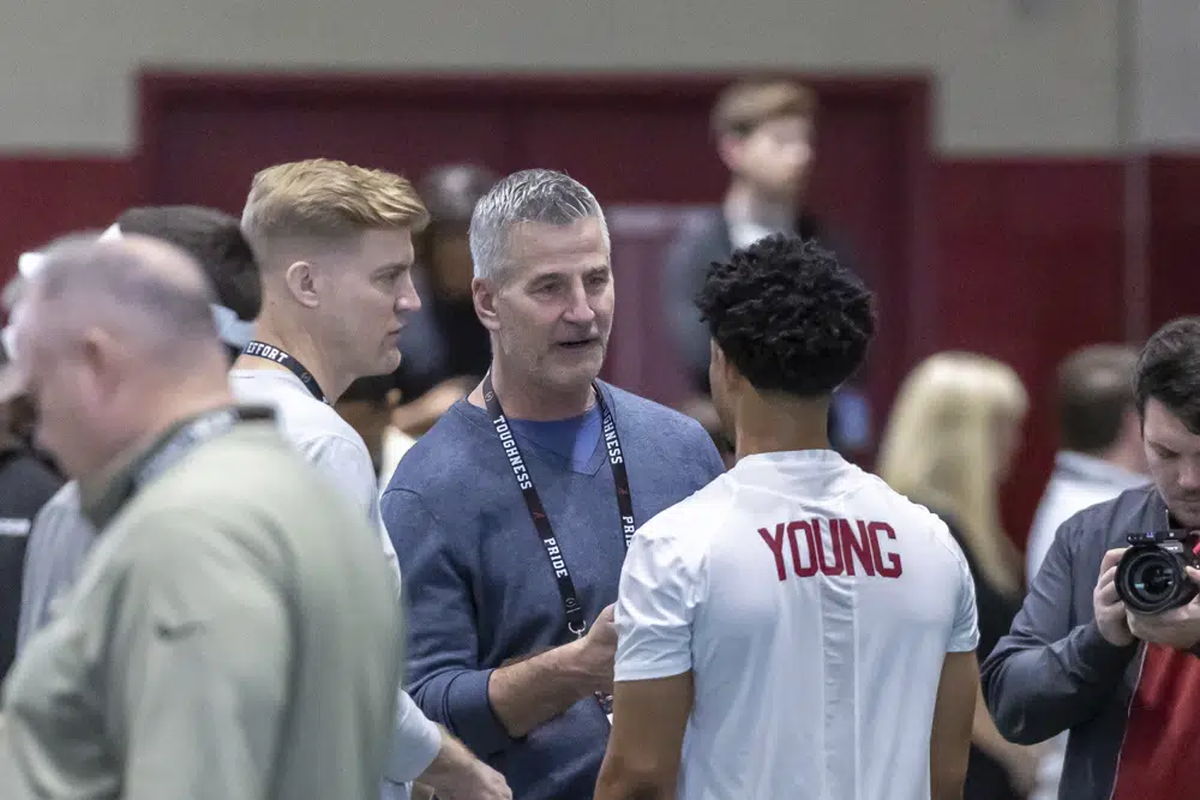Trade-ups for quarterbacks becoming more common in NFL

By Josh Dubow
Tired of spending years in the quarterback wilderness, shuffling in a string of mostly ineffective veterans at the game’s most important position, the Carolina Panthers made a bold move that has been all too common in recent years.
The Panthers packaged two first-round picks, two second-round picks and star receiver D.J. Moore to move up from No. 9 in the draft to the top overall selection to give Carolina the pick of the lot at quarterback in next week’s draft.
“You go get the guy that you want,” Panthers general manager Scott Fitterer said before making the move. “If you have a conviction on a guy, you go get him.”
Whether that guy is betting favorite from FanDuel Sportsbook Bryce Young, or one of the three other QBs projected to go in the first round — C.J. Stroud, Anthony Richardson or Will Levis — won’t be known for certain until next Thursday night.
This marks the first time since 2016 that a team traded the top pick, with the Rams trading up to take Jared Goff that season.
“If you don’t have one, you have no shot,” former Jets general manager Mike Tannenbaum said of the predicament in the modern NFL. “Without one of those quarterbacks, it’s really hard to be competitive.”
Tannenbaum traded up 12 spots in the 2009 draft to take Mark Sanchez fifth overall in 2009. While Sanchez never developed into a star, the Jets did manage to make the AFC title game his first two seasons as starter.

FILE – Heisman Trophy finalists Ohio State quarterback C.J. Stroud, left, speaks alongside Alabama quarterback Bryce Young during a news conference before attending the Heisman Trophy award ceremony, Saturday, Dec. 11, 2021, in New York. The Carolina Panthers packaged two first-round picks, two second-round picks and star receiver D.J. Moore to move up from No. 9 in the draft to the top pick to give Carolina the pick of the lot at quarterback in next week’s draft. (AP Photo/John Minchillo, File)
Moves like that only became more common following the introduction of the rookie wage scale in the 2011 collective bargaining agreement that gave teams with a QB on an entry-level contract the ability to use those savings to build up the rest of the roster.
“There’s such a discernible advantage when you can get any sort of production in the first couple of years because of the discount you’re getting is so material,” Tannenbaum said.
That was just the thinking that led to the Panthers’ decision.
After a good run behind 2011 No. 1 overall pick Cam Newton that included a trip to the Super Bowl in the 2015 season, the Panthers have had a conveyor belt of starters the past five seasons.
Carolina has used eight starting quarterbacks in that span starting with Newton’s final stretch as starter for the Panthers, trading draft picks for veterans such as Teddy Bridgewater, Sam Darnold and Baker Mayfield.

FILE -Kansas City Chiefs quarterback Patrick Mahomes (15) holds the trophy after their win against the Philadelphia Eagles in the NFL Super Bowl 57 football game, Sunday, Feb. 12, 2023, in Glendale, Ariz. For every example such as Kansas City’s move to trade up for two-time MVP Patrick Mahomes in 2017 or Buffalo’s decision the next year to move up for franchise quarterback Josh Allen, there are misses. (AP Photo/Matt Slocum, File)
The results have been lacking as Carolina has posted the fifth-worst record and the second-worst passer rating in the NFL during that span, leading to the decision to trade for the top pick, who the Panthers hope can be a building block for the future.
“Go draft, because if you hit it right and you get a young quarterback who’s a superstar, you’ve got five years under contract,” said coach Frank Reich, who had a similar run of veterans at his previous job in Indianapolis with only moderately more success than Carolina.
“Where if he’s a superstar on a first contract, as opposed to a guy making $50 million who’s a superstar who’s on his third contract, that just allows you to build a stronger team. So you’ve got to take advantage of those years.”
The history of these moves is mixed, which is fitting considering how much difficulty teams have identifying which college prospects will turn into NFL stars.
For every example such as Kansas City’s move to trade up for two-time MVP Patrick Mahomes in 2017 or Buffalo’s decision the next year to move up for franchise quarterback Josh Allen, there are misses.

FILE – Commissioner Roger Goodell, left, poses with USC’s Sam Darnold after being picked by the New York Jets during the first round of the NFL football draft, Thursday, April 26, 2018, in Arlington, Texas. Whether it’s the Jets giving away three extra second-round picks to move up and take San Darnold third overall in 2018 or the 49ers giving up three first-round picks to draft Trey Lance third overall in 2021 only to have him start four games his first two seasons, there have been many misses. (AP Photo/David J. Phillip, File)
Whether it’s the Jets giving away three extra second-round picks to move up and take San Darnold third overall in 2018 or the 49ers giving up three first-round picks to draft Trey Lance third overall in 2021 only to have him start four games his first two seasons, there have been many misses.
That history hangs over the Panthers headed into this year’s draft and potentially other teams such as Indianapolis (fourth pick), Las Vegas (seventh pick) or Tennessee (11th pick) that could be considering moving up for a quarterback.
“Look it’s the hardest position to find,” Colts general manager Chris Ballard said. “I mean, everybody’s grabbing the phone and when you find one you know you do whatever it takes to keep that guy and but it’s difficult position to evaluate difficult. A difficult position.